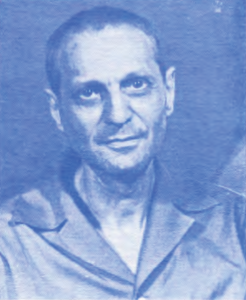“We will respond, even in the face of irony and slander, with the sweetness of love.
We can afford to take this attitude because good anvils do not fear the blows of many hammers.”
Pastor Richard Wurmbrand

“We will respond, even in the face of irony and slander, with the sweetness of love.
We can afford to take this attitude because good anvils do not fear the blows of many hammers.”
Pastor Richard Wurmbrand
Very few people are as familiar with suffering and persecution as Pastor Richard Wurmbrand, the founder of Voice of the Martyrs.
Pastor Richard Wurmbrand was one of the top figures in Romania’s underground church during the time of communist occupation. He spent more than 14 years in a communist prison, where he was tortured, brainwashed, and drugged—all of this because he was a Christian. Wurmbrand was not a Christian by birth, however, and his journey into the faith is a long and complex one.
A Romanian Jew by background, Pastor Wurmbrand was discriminated against by non-Jewish neighbors long before the Nazis arrived. Young Wurmbrand struggled with the loss of his father, who died when he was nine, and turned to Communism for the answer. For a time, Wurmbrand was a Cominterm agent who was pursued by Romania’s secret police. He was arrested several times for this.
When he wasn’t busy working towards Revolution, young Wurmbrand was also keenly interested in seeking out all the pleasures that life had to offer. Even after he married his wife, Sabina Oster, the young Wurmbrand continued to chase after gratification and thrills. It was this tendency that left him with a particularly bad case of tuberculosis.
While recovering in a sanatorium, Wurmbrand met a Romanian Christian carpenter by the name of Christian Wolfkes. For years, this carpenter had been praying for the opportunity to bring a Jew to Christ and so he saw Wurmbrand as an answer to his prayer. Through Wolfkes’ care and prayer, Wurmbrand accepted Christ.
Wurmbrand, and later his wife, joined the Anglican Church’s Ministry among Jewish people. He was ordained as a Lutheran minister and, despite the obvious danger, began ministering to those who were persecuted. When fascists took control of Romania, Wurmbrand ministered to war-torn families. They smuggled Jewish orphans from ghettos, preached in bomb shelters, and organized relief programs for Hungarian gypsies. Then, when Communists took control of Romania, Wurmbrand continued to minister to the persecuted. He and his wife—despite being Jewish—helped several German soldiers escape Romania.
“God is always on the side of the persecuted,” Pastor Wurmbrand said.
When the Communists gathered together a meeting of Romania’s religious leaders, Pastor Wurmbrand risked his life to speak the truth about the relationship between Christ and Communism: “Our loyalty is due first to Christ.” Although Wurmbrand managed to escape the meeting unharmed, this action was one of many that lead to his 14-year imprisonment.
Pastor Wurmbrand was subject to all sorts of stomach-churning torture while imprisoned: he was deprived of sleep, beaten relentlessly with truncheons, drugged into delirium, and had his feet flogged to the bones.
“It was an image of hell,” Wurmbrand said, “in which the torment is eternal and you cannot die.”
The torturers wanted to know Wurmbrand’s contacts in the underground church. But Pastor Wurmbrand never once relented—even when he nearly died of pneumonia.
Eventually, Pastor Wurmbrand was ransomed out of Romania for a sum of $10,000. Rather than enjoying an easy and pleasure-filled life, Wurmbrand worked to become the voice of the persecuted church. He founded an organization called Jesus to the Communist World, later renamed Voice of the Martyrs, to meet this end.
Different Voice of the Martyrs organizations sprung up around the world from the seed that Wurmbrand sowed. Although each of these organizations are autonomous and independent, they work together to achieve a common goal: Supporting the underground church. There is no world headquarters or main office for The Voice of the Martyrs, as each organization is an independent, self-supported entity.
Although “freed”, Pastor Wurmbrand continued to face persecution in the free world when he attempted to raise awareness of the underground church in the communist world. Many prestigious Christians and Christian groups refused to believe Wurmbrand’s testimony of Christians being persecuted in the communist world (a testimony which history has overwhelmingly proven to be true). Furthermore, Christians in the “free” world were not as passionate about their faith as the Christians in the underground church.
“Whoever has known the spiritual beauty of the underground church cannot be satisfied anymore with the emptiness of some Western churches,” Wurmbrand explained. “I suffer in the West more than I suffered in a communist jail because now I see with my own eyes Western civilization dying.”
Wurmbrand saw in the “Free” world the same pattern that he saw in Romania: Persecution would come to the “Free” world, just as it had come to Romania. In an attempt to prepare the church in the “free” world for the coming persecution, Wurmbrand wrote the book Preparing for the Underground Church.